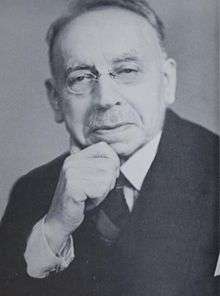Israel Cohen (Zionist)

Israel Cohen (1879–26 November 1961) was an Anglo-Jewish, Zionist leader, writer, and journalist.
Born to Polish Jewish immigrants in Manchester, England in 1879, Israel Cohen was educated at Manchester’s Jews’ School (1884-1892), Manchester Grammar School (1892-1895); and then simultaneously at Jews’ College and University College, London, where he received his BA. From 1895 on, Cohen became actively involved in the Zionist cause.
Upon reading an article in the Jewish Chronicle about pogroms in Russia, Cohen became interested in Jewish affairs and political matters in 1891. Following a speech given by Theodore Herzl, he was further inspired to join the ranks of the Zionist movement in 1896 and became a lifelong supporter of the Zionist movement upon the establishment of the World Zionist Organization at the First Zionist Congress in Basel in August 1897.
From 1909 to the beginning of World War II Cohen directed the English department of the Zionist Central Office in Cologne and later in Berlin. During World War I he was interned in Ruhleben prison for sixteen months from November 1914. He described these experiences in Ruhleben Prison Camp: A Record of Nineteen Months’ Internment, which was published in 1917.
In 1918 Cohen became secretary for the World Zionist Organization in London. During the years 1918-1921, he carried out a number of important diplomatic and fund-raising missions on behalf of the Zionist leadership. These took him to Poland and Hungary, where he investigated and reported on the recent surge in pogroms and other anti-Jewish acts of violence; and to Jewish communities in Australia, Hong Kong, India, China, and Japan. In Harbin, China, Cohen sought aid for the Palestine Restoration Fund, whose goal it was to purchase Palestine from Turkey.[1] Cohen later described his encounters in The Journey of a Jewish Traveller (1925), and A Jewish Pilgrimage: The Autobiography of Israel Cohen (1956).
Following the Zionist Congress of 1921, which took place in Karlsbad, Cohen was appointed general secretary of the Zionist organization in London, a position he held through 1939. He was also a member of the Board of Deputies of British Jews, and in 1946 he was appointed head of its Foreign Affairs Committee delegation to the peace conference in Paris.
Cohen wrote prolifically on the subjects of Zionism, anti-Semitism, and other areas of Jewish concern. His first publication was an article that appeared in the Manchester Evening Chronicle in September 1897. This was followed by a short sketch that appeared in January 1898 in the Jewish World. He subsequently wrote hundreds of newspaper articles and pamphlets for both Jewish and non-Jewish publications alike.
When working in Germany, Cohen became the Berlin correspondent for The Times and Manchester Guardian, and continued to represent the latter at every Zionist Congress up until 1946. Among his many book credits, in addition to the aforementioned titles, are: Israel in Italien (1909), Zionist Work in Palestine (1911), Jewish Life in Modern Times (1914), A Ghetto Gallery (1931), Britain’s Nameless Ally (1942), History of the Jews of Vilna (1943), The Jews in the War (1943), The Zionist Movement (1946), The Progress of Zionism (1947), and Theodore Herzl – Founder of Political Zionism (1959).
Israel Cohen died in London on 26 November 1961.
References
- ↑ Fogel, Joshua (2015). "The Japanese and the Jews". Between China and Japan: The Writings of Joshua Fogel. Brill. p. 386.
Oxford Dictionary of National Biography, Oxford University Press, 2004 (http://www.oxforddnb.com/view/article/57107, accessed 28 July 2014).
Encyclopaedia Judaica, Volume 4, Jerusalem: Keter Publishing House, 1972.
Schneiderman, Harry and Itzhak J. Carmin, ed. Who’s Who in World Jewry: A Biographical Dictionary of Outstanding Jews. New York: Monde Publishers, Inc., 1955.
Cohen, Israel. A Jewish Pilgrimage: the Autobiography of Israel Cohen. London: Vallentine, Mitchell, 1956.
Works
- Historical syllabus from 1700 C.E. to the present day : a course of thirteen readings [S.l. : s.n. 1900?
- Zionism & Jewish ideals : a reply to Mr. Laurie Magnus London: English Zionist Federation 1909
- Zionist work in Palestine (editor) London: Pub. on behalf of the Zionist Central Office by T. F. Unwin 1911
- Zionist work in Palestine (editor) New York, Judaean publishing company, 1912
- The Zionist movement: its aims and achievements London : Published on behalf of the Zionist Central Office, Berlin, by W. Speaight 1912
- Jewish life in modern times London : Methuen and co. ltd., [1914]
- The Ruhleben prison camp: a record of nineteen months' internment, by Israel Cohen ... with twenty-six illustrations and a plan. London, Methuen & co. ltd. 1917
- The German attack on the Hebrew schools in Palestine London : Offices of the Jewish Chronicle and the Jewish World, 1918
- Anti-Semitism in Germany London : Offices of the Jewish Chronicle and the Jewish World, 1918
- A report on the pogroms in Poland [London] : Central office of the Zionist organisation 1919
- Jewish life in modern times New York, Dodd, Mead and Company 1925
- The Zionist movement. Edited and rev. with supplementary chapter on Zionism in the United States (editor) New York, Zionist Organization of America, 1946.
- Theodor Herzl, founder of political Zionism New York,: T. Yoseloff 1959